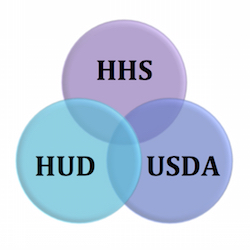
The Department of Health and Human Services and the Department of Housing and Urban should include the Department of Agriculture in collaborations involving housing and health services for older adults living in affordable seniors housing and other settings, the Government Accountability Office recommended Thursday in a new report.
HUD and the USDA provide housing assistance to low-income older households, and several HHS programs provide those households with health services, the GAO noted. The report recommended that the three agencies work together to define common outcomes and identify opportunities to include the USDA in future collaborations. The GAO said the agencies concurred with the report’s recommendations.
“The fewer the silos with regard to service provision, the easier it will be for the correct entities to be doing their part to help individuals age in place and decrease unnecessary healthcare utilization,” Taryn Patterson, policy research associate at the LeadingAge LTSS Center @UMass Boston, told McKnight’s Senior Living.
Patterson is a researcher on the Integrated Wellness in Supportive Housing project mentioned in the report, for which HUD awarded a research contract to LeadingAge, the Lewin Group and the national Center for Healthy Aging. The project is testing the ability of an enhanced supportive services model to help elderly residents of affordable housing properties age in place and stay out of emergency departments, hospitals and nursing homes.
It “takes a person-centered approach, with the resident at the center, driving their own healthcare, wellness and social decisions,” Patterson said.
Previous research by LeadingAge and the Lewin Group found that the availability of an on-site service coordinator, such as a social worker, at federally subsidized seniors housing reduced hospital admissions among residents by 18%, she pointed out.
Ruth Katz, LeadingAge senior vice president of policy and advocacy and a former policy analyst with HHS, said she’d like to see more demonstration projects that are person-centered.
“When it gets down to the level of the person, then we just start to divide them up between what HUD is going to pay for and what HHS is going to pay for and what Agriculture will pay for and what the state will pay for,” she said. “People don’t work like that. People have needs, and they are not thinking about a program. They’re thinking about what their needs are.”
Overall, Katz said, the GAO report “points to the fact that we need everyone at the table. We think housing with services is really, really important. We think it’s not just health. For people’s lives, they need a lot more than just health. And so we think it’s a great idea to think about demonstrations, and maybe even some demonstrations where you bring other departments to the table, and USDA would certainly be a good one.”
Ultimately, however, Katz said: “We are thinking that continuing the existing demonstration programs, when they expire, would be great, and that working on new demonstrations to bring in other departments would be great, but also that we’ve learned a lot from the demonstrations that have already happened and to think about maybe something more permanent that we can stop demonstrating and start actually doing. This stuff works.”
The GAO wrote the report at the request of Rep. Maxine Waters (D-CA), the ranking member on the House Committee on Financial Services.



